The holidays are here and that means more food than we (or your dog!) can imagine. It’s natural that you would want your dog to share in the festivities with a special treat from the table, but many popular holiday and Christmas dishes include ingredients that are not safe for dogs, like onion, sugar, and chocolate. Others, while not toxic, are just not healthy, such as those high in fat and starch. Butter, milk, and cheese can really tear up a dog’s stomach. But this list of foods are okay to feed your dog!
But remember, the following dog-safe foods are safe in small quantities to allow your dog a taste of the season. Just a few treats will make your pup feel special without you paying for an emergency vet visit. And, if your dog is on a special diet from your vet, talk to them before feeding any of these foods. After all, we all want the holidays to remain calm and bright!
9 Holiday Foods That Are Safe To Share With Your Dog
#1 – Turkey
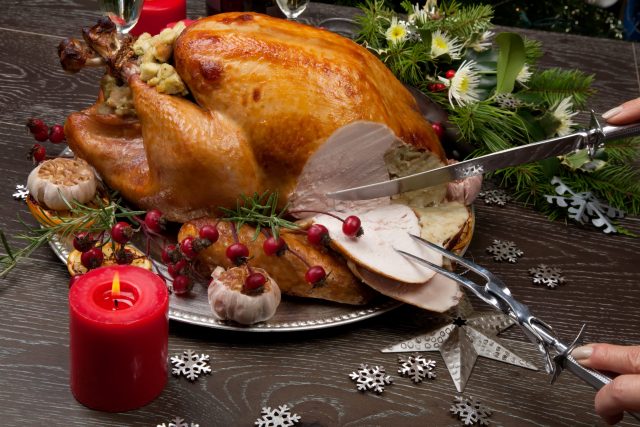
Unseasoned turkey meat can be a great source of lean protein for dogs. It contains nutrients like riboflavin and phosphorus, which are good for their health. Just make sure it’s plain and cooked. Seasoned turkey, however, is a no-go. Many seasonings, including garlic and onions, are toxic to dogs and can cause serious health issues. Even if it’s just a bit of seasoned skin, it’s best to avoid giving it to them.
And about the bones…Never give your dog cooked turkey bones. These can splinter easily and cause choking or serious damage to your dog’s digestive tract. Raw bones are also risky as they can harbor harmful bacteria like Salmonella. So, when you’re sharing turkey, ensure it’s boneless and well-cooked. And as with all things, moderation is key.
#2 – Cranberries
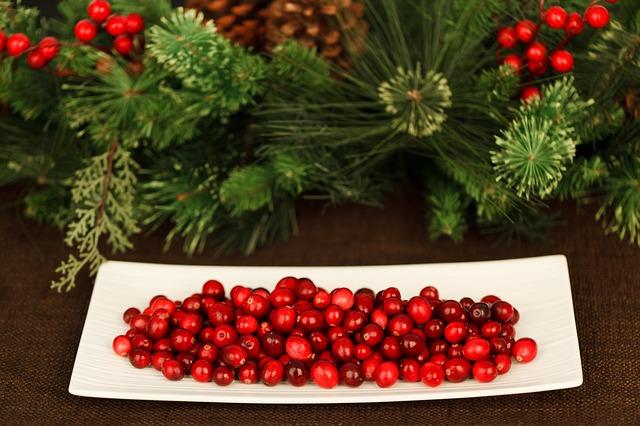
Fresh cooked or frozen plain cranberries can be a nice little treat for your dog. Cranberries are packed with antioxidants, which are great for fighting off those pesky free radicals. This means these tart berries can help bolster your dog’s immune system and even reduce inflammation. Plus, they’re a solid source of vitamin C and dietary fiber, both of which are beneficial for overall health and digestion.
Regarding urinary health, cranberries are somewhat of a superstar. They’re known for their ability to help prevent bacteria from sticking to the bladder and urinary tract walls. This can be particularly helpful in reducing the risk of urinary tract infections, which is a big plus.
But, and this is important, moderation is key. You don’t want to overdo it with cranberries. Just a few here and there as a treat are enough. Too many, and you might be dealing with an upset stomach or diarrhea. And steer clear of cranberry products like cranberry sauce or juice. Those often have added sugars or other ingredients that aren’t great for dogs. But this recipe for Cranberry Dog Treats from Honest Kitchen is dog-friendly and drool-worthy!
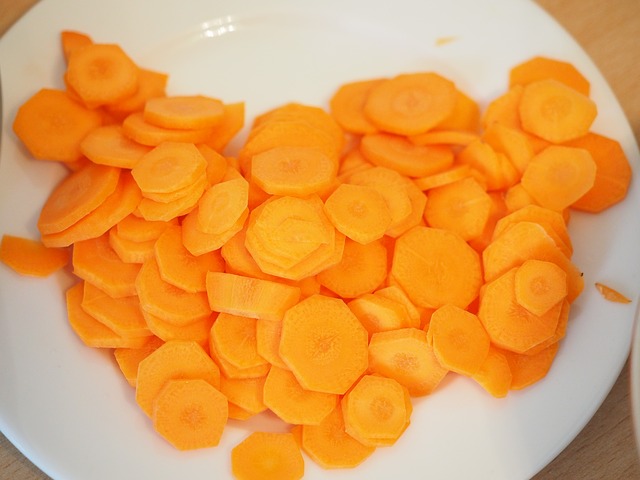
Carrots are a fantastic snack for our canine friends. Firstly, they’re low in calories and high in fiber, which is great for a dog’s digestive system. This makes them an excellent treat, especially for dogs that need to watch their weight.
But carrots are more than just low-calorie snacks. They’re packed with important vitamins and minerals. For example, they’re a great source of beta-carotene, which the body converts into vitamin A. And vitamin A is super important for your dog’s vision, skin, and coat health. Plus, carrots have vitamins K and C and are rich in potassium, which supports heart and muscle health.
One of the fun parts about carrots is their crunchiness. Chewing on raw carrots can actually be good for your dog’s dental health. It can help scrape off plaque and tartar from their teeth. It’s like a natural dental chew!
Now, a couple of tips for feeding carrots to dogs. First, always cut them into bite-sized pieces to prevent choking, especially for smaller dogs. And if you have an older dog or a pup with sensitive teeth, cooked carrots are a softer alternative.
#4 – Pumpkin
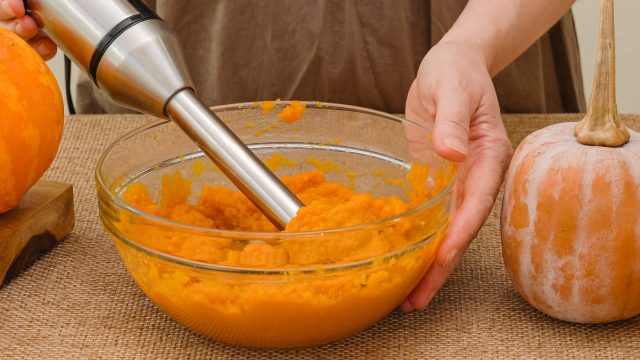
Pumpkin can be a great treat for your furry little pumpkin, especially when it comes to their digestive health. It’s packed with fiber, which can help with both constipation and diarrhea. So, if your pup is having some tummy troubles, a little bit of pumpkin might just do the trick. It’s a natural way to help get their digestive system back on track.
But that’s not all. Pumpkin is also loaded with important nutrients. It’s a great source of vitamins like A, C, and E, which are essential for maintaining healthy skin, coat, vision, and immune system. And it’s got a good dose of minerals like potassium for muscle health and iron for blood health.
Want to serve you pup some pumpkin? First, make sure it’s plain, pureed pumpkin, not the pumpkin pie filling you find in stores around around the holidays. The pie filling has spices and sugar that aren’t good for dogs. And just like with anything new, start with a small amount to see how your dog reacts. Portion control is key here. Too much pumpkin can cause its own set of tummy issues, so it’s best to use it as a supplement to their regular diet, not a replacement.
If you’re ready for some baking fun with pumpkin, get in the kitchen and try one of these 10 Christmas Cookie Recipes For Dogs!
#5 – Green Beans
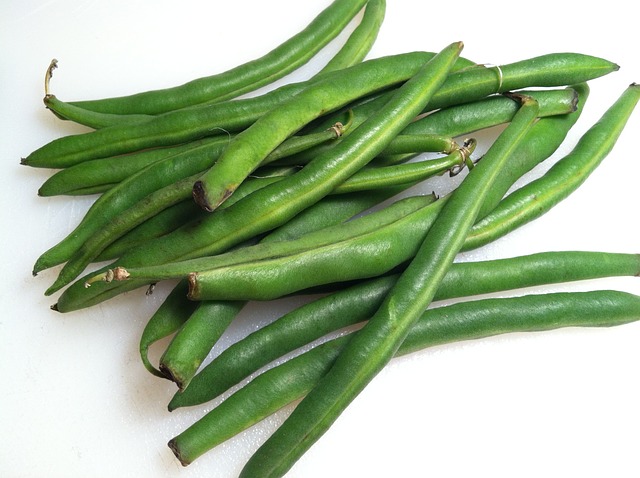
Green beans are a great, healthy snack for dogs. They’re low in calories but high in important nutrients, making them an excellent treat, especially for dogs that need to maintain a healthy weight. Another fiber powerhouse, green beans can help keep things moving smoothly in the digestive tract and can be really beneficial for dogs who might be a bit constipated. They’re also loaded with vitamins and minerals like vitamin C, vitamin K, and manganese. Vitamin C is great for the immune system, vitamin K is essential for healthy blood clotting, and manganese supports bone health and helps the body process proteins and carbohydrates.
But here’s an important thing to remember: while plain green beans are great, green bean casserole is a no-go for dogs. That dish usually contains ingredients like onions, garlic, and mushrooms, which can be harmful to dogs. Plus, it’s often loaded with creams or sauces that are too rich and fatty for them.
When feeding green beans to your dog, it’s best to keep it simple. Fresh, steamed, or canned green beans (as long as they’re unsalted) are all fine. Just avoid anything with added salt, spices, or other seasonings. Green beans should be a complement to a well-balanced diet, not a replacement for their regular meals.
#6 – Potato
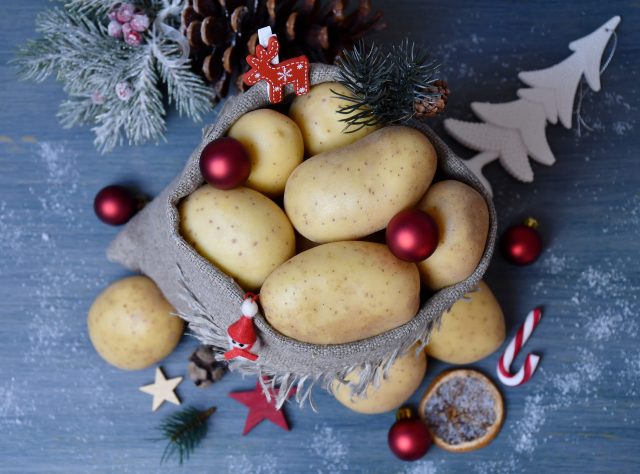
Potatoes can be a safe and healthy addition to your dog’s diet, but there are a few important things to keep in mind. First off, potatoes are a good source of vitamins and minerals, like vitamin C, vitamin B6, and potassium. Vitamin C is important for the immune system, B6 plays a crucial role in various bodily functions including glucose generation, nervous system function, and hormone regulation, and potassium is essential for heart health. Potatoes also contain fiber, which we know is good for dog tummies.
However, it’s crucial to serve potatoes properly. Raw potatoes, especially green ones, contain solanine, a compound that can be toxic to dogs. So, it’s important to cook the potatoes thoroughly to reduce the solanine levels. Boiling or baking without any added salt, butter, or seasonings is the way to go. Also, you want to avoid feeding dogs any form of processed potatoes, like chips or fries. These often have high levels of salt and fat, which aren’t good for dogs.
And while they taste so good, potatoes should only be an occasional treat, not a regular part of your dog’s diet. They’re high in carbohydrates, and too many carbs can lead to weight gain and other health issues in dogs. Also, steer clear of dishes like mashed potatoes or potato salad. These often contain ingredients like onion, garlic, milk, and seasonings that can be harmful to dogs.
#7 – Sweet Potatoes
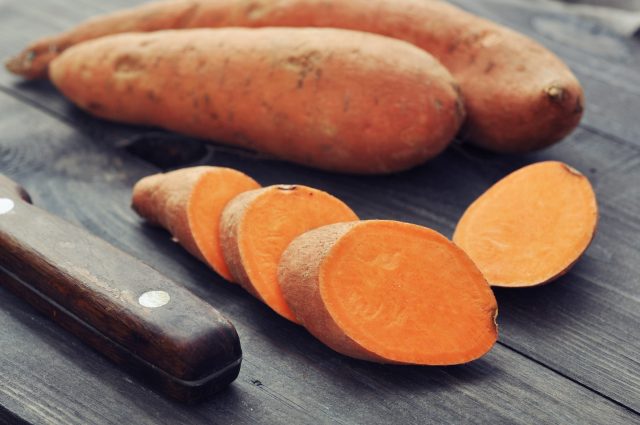
Sweet potatoes are an excellent addition to a dog’s diet, offering numerous health benefits. They are high in dietary fiber, which is essential for a healthy digestive system, helping to prevent constipation and promote regular bowel movements. This fiber content is also beneficial for dogs with loose stools. Besides their fiber richness, sweet potatoes are naturally low in fat, making them a great food choice for weight management in dogs. They’re packed with vital vitamins such as A, C, and B6. Vitamin A is important for eye health, skin, and coat condition, as well as for proper nerve and muscle functioning. Vitamin C is known for boosting the immune system, and B6 plays a crucial role in brain function and hormone regulation.
These tasty tubers also provide essential minerals like manganese, copper, and iron, supporting overall health. Their high antioxidant content is another significant benefit, as it helps combat damage from free radicals and may reduce the risk of certain diseases. Apart from their health benefits, sweet potatoes are versatile and generally appealing to dogs due to their natural sweetness. They can be prepared in various dog-friendly ways, such as boiled, baked, or dehydrated as chips. Additionally, they are a good option for dogs with sensitive stomachs or food allergies, serving as a beneficial carbohydrate alternative to grains.
#8 – Apples
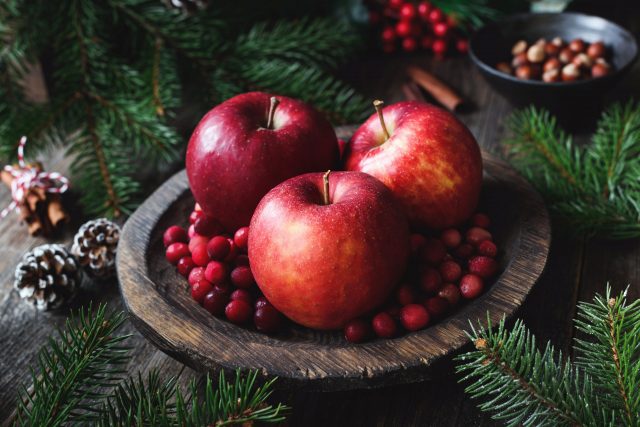
Apples can be a fantastic, healthy treat for dogs when given correctly. Apples are loaded with vitamins A and C, which are great for your dog’s skin and coat health, as well as for their immune system. They also contain fiber, which is good for digestion. Plus, apples have a bit of sweetness to them, which most dogs find pretty tasty. Chewing on apple slices can help clean your dog’s teeth and freshen their breath.
But, here’s the deal with apples – you have to prepare them properly. The seeds should be removed because they contain cyanide, which can be harmful to dogs in large quantities. Also, the core can be a choking hazard, so it’s best to cut the apple into bite-sized pieces that are easy for your dog to chew. One more thing to remember: Avoid processed apple products like apple pie or apple sauce that might contain added sugars or spices. These are not suitable for dogs. But this recipe for Ginger Apple Turkey Dog Treats is!
#9 – Peas

Peas can be a plus for pups because they’re packed with vitamins like A, B, and K, and minerals such as iron, zinc, potassium, and magnesium. Vitamin A is great for vision, skin, and coat health, while the B vitamins help with overall health and wellbeing. Iron and zinc are crucial for various bodily functions, including immune system support. Another big plus is that peas are high in fiber and protein, which can be beneficial for your dog’s digestion and muscle health. They’re also relatively low in calories, making them a good treat for dogs who are watching their waistline.
Now, when feeding peas to your dog, there are a couple of things to remember. Like green beans, they should be plain – no added salts, seasonings, or sauces. Whether you choose fresh, frozen, or canned peas, ensure they’re served plain. If you’re using canned peas, look for ones that are labeled as “no salt added.”
However, you’ll want to avoid feeding your dog pea pods, especially if you have a smaller dog, as they can be a choking hazard. Also, it’s best to avoid peas if your dog has kidney problems, as they contain purines, a compound that can exacerbate kidney issues.

